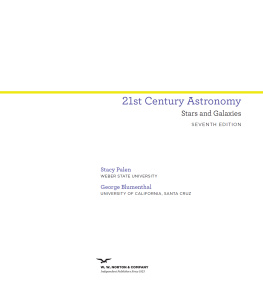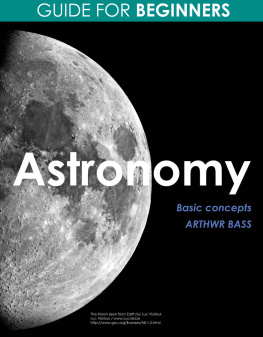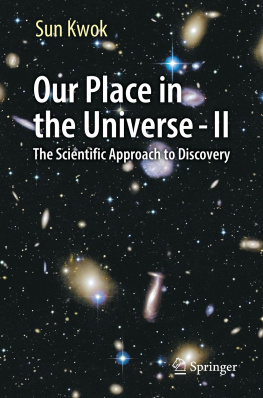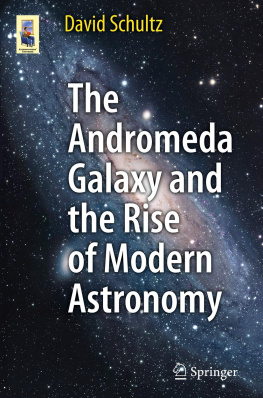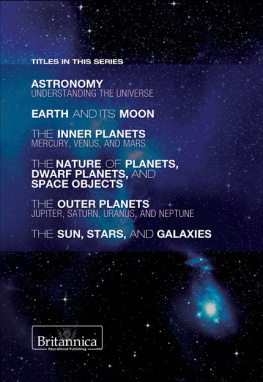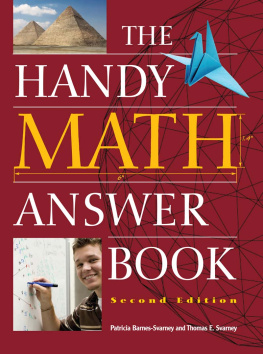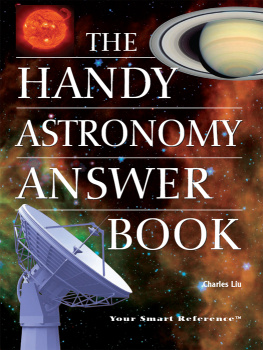Understanding the Universe
George Greenstein is the Sidney Dillon Professor of Astronomy, Emeritus at Amherst College, Massachusetts. He is an accomplished writer, having written one textbook, three books on science for the general public and numerous magazine articles. One of his books won both the American Institute of Physics/US Steel science-writing award and the Phi Beta Kappa Award in Science. Professor Greenstein is a recognized leader in the American Astronomical Society's effort to reform astronomy education in the United States. Some time ago he co-organized a series of workshops for department chairs of the most prestigious universities in the country, which led to a set of proposed goals for reform of introductory astronomy courses nationwide. Professor Greenstein's field of research interest is theoretical astrophysics.
... an inquiry approach that explores the nature of scientific research sets this book apart from other textbooks. The readings and exercises are scaffolded to allow the students to build their own understanding of the big ideas in astronomy. The separation into different math levels makes it appropriate for a wide range of classes. I really liked the problem sets that required students to describe the logic behind their solutions.
Mary Kay Hemenway, University of Texas at Austin
... a compelling and powerful introduction to astronomy, laying bare the fundamentals of scientific arguments and the scientific process.
Steven Furlanetto, University of California-Los Angeles
... delivers on its promises. It is indeed inquiry based, and overtly uses astronomy as a means to explore the nature of science... [this text] does not merely tell students about the Universe; it helps them understand the Universe.
Bruce Partridge, Haverford College
George Greenstein has done an excellent job of clearly explaining the most important aspects of astronomy. His book brings the reader along on a journey of discovery and treats what we know and how we know as equally important. Exhorting students to actively participate rather than passively memorize reinforces a message that almost all instructors send. I encourage my colleagues teaching introductory astronomy to consider this book carefully.
Pauline Barmby, Western University
This unique text provides a superb framework for introducing students to the approaches scientists take to solving problems. By posing a variety of mysteries faced by both ancient and contemporary astronomers, gathering and presenting data, searching for patterns, asking questions, posing and testing hypotheses both qualitatively and quantitatively, Greenstein introduces his readers to the tools of the detective-scientist.
Stephen Strom, National Optical Astronomy Observatory
Understanding the Universe
An Inquiry Approach to Astronomy and the Nature of Scientific Research
George Greenstein
Amherst College, Massachusetts
CAMBRIDGE UNIVERSITY PRESS
Cambridge, New York, Melbourne, Madrid, Cape Town, Singapore, So Paulo, Delhi, Mexico City
Cambridge University Press
The Edinburgh Building, Cambridge CB2 8RU, UK
Published in the United States of America by Cambridge University Press, New York
www.cambridge.org
Information on this title: www.cambridge.org/9780521145329
G. Greenstein 2013
This publication is in copyright. Subject to statutory exception and to the provisions of relevant collective licensing agreements, no reproduction of any part may take place without the written permission of Cambridge University Press.
First published 2013
Printed and bound in the United Kingdom by the MPG Books Group
A catalog record for this publication is available from the British Library
Library of Congress Cataloging-in-Publication Data
Greenstein, George, 1940
Understanding the Universe: An Inquiry Approach to Astronomy and the Nature of Scientific
Research / George Greenstein.
p. cm.
ISBN 978-0-521-19259-0 (Hardback) ISBN 978-0-521-14532-9 (Paperback) 1. Astronomy.
2. ResearchMethodology. I. Title.
QB61.G744 2012
520dc23 2011042772
ISBN 978-0-521-19259-0 Hardback
ISBN 978-0-521-14532-9 Paperback
Additional resources for this publication at www.cambridge.org/greenstein
Cambridge University Press has no responsibility for the persistence or accuracy of URLs for external or third-party internet websites referred to in this publication, and does not guarantee that any content on such websites is, or will remain, accurate or appropriate.
To all my students
It was you who taught me how to teach
Contents
Preface
To the instructor
The philosophy behind this book
When I was in college studying science, I found the experience fundamentally unsatisfying. I was continually oppressed by the feeling that my only role was to shut up and learn. I felt there was nothing I could say to my instructors that they would find interesting. Nor did I feel that there was anything I could tell my fellow-students that they would find interesting. As I sat in the science lecture hall, I was utterly silent. That's not a good state to be in when you are 19 years old.
Doubly galling was the fact that at the same time my roommate was taking a history course. One day he came back to our dorm room filled with excitement over a class discussion. (The question was whether President Truman was right to have dropped the atom bomb on Hiroshima.) Another friend at the time was taking a literature course, and he mentioned to me that, during a class discussion, he had made a point the instructor himself had found striking.
Meanwhile, I was busy with Ampre's law. We never had any fascinating class discussions about this law. No one, teacher or student, ever asked me what I thought about it.
We professors have a tendency to think that independent, creative thinking cannot be done by non-science students, and that only advanced science majors have learned enough of the material to think critically about it. I believe this attitude is false. This book is designed to move beyond a shut up and learn format, and to challenge students to think for themselves even at the beginning level. It asks students to use their native intelligence to actually confront subtle scientific issues.
Unique features of this book
As the title suggests, this book emphasizes student-active learning . Rather than emphasizing the facts of astronomy, it emphasizes how we know them, and it regularly involves the student in the chain of arguments that lead to them. Although the book's mathematical level is appropriate for non-scientists, it asks a good deal of the reader, and it wrestles with conflicting theories, incomplete evidence and hypothesis testing. We hope that, ten years from now, our students will remember what we taught them about the Universe but it is also important that they remember the habits of mind that have allowed us to discover these facts, and that they followed with comprehension and interest the development of our understanding.
The book covers a smaller number of topics than most texts, strictly confining attention to those most essential to the field. Recognizing that this may be the only science course the student ever takes, it devotes greater than usual attention to how we know what we know . Recognizing that few students are taking this course in order to prepare for another, it makes no attempt to cover every astronomical subject. Rather, it spends as much time as needed to develop a full understanding of each topic.


